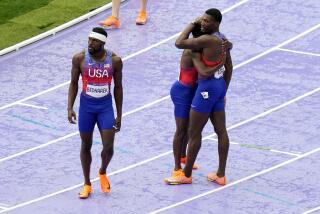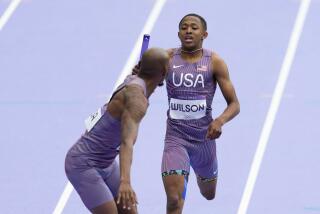Canada Outruns U.S. for Gold in 400 Relay
- Share via
Olympic history was made in Atlanta on Saturday night, not with a victory but with a defeat.
In its first outright loss, the United States failed to win the gold medal in a men’s 400-meter relay and, in doing so, refueled the controversy over the exclusion of nine-time gold-medal winner Carl Lewis from the American team.
Canada won the race in convincing fashion, with 100-meter gold-medal winner Donovan Bailey dominant on the anchor leg, easily outrunning Dennis Mitchell of the United States.
The Canadians’ winning time of 37.69 seconds was the fastest ever by a non-American team and the sixth-fastest ever. The U.S. team finished in 38.05 to earn the silver medal. Brazil won the bronze in 38.41.
Before Saturday’s race, no U.S. men’s 400-meter relay team had finished other than first in the Olympic Games. The only other times the Americans failed to win the gold were when they were disqualified in 1912, 1960 and 1988 and when the United States boycotted the 1980 Games in Moscow.
The second-guessing by television commentators and others began the second Bailey hit the tape, but U.S. Olympic track and field Coach Erv Hunt and the four relay runners he selected--Jon Drummond, Tim Harden, Mike Marsh and Mitchell--refused to speculate what might have happened had Lewis run.
It was Hunt who decided, after a weeklong debate in the media, not to include Lewis, despite the fact the 35-year-old had anchored six 400-meter relay teams to world records, including a world-record of 37.40 seconds at the 1992 Barcelona Olympics.
When Leroy Burrell withdrew from the race Saturday afternoon, citing an injured Achilles’ tendon, there was speculation that Hunt would bring Lewis into the team to run the anchor leg. But after briefly considering the idea, Hunt instead chose Harden, the NCAA champion.
“We really felt like we should just stick with the group that we had instead of trying to make some wholesale change,” he told the Associated Press. “And that’s what it would have come to. We would have had to switch around two or three legs.”
Drummond gave the U.S. team a slight lead on the first leg, but Harden, who had run in the earlier rounds of the relay, lost ground on the second leg and did not pass the baton cleanly to Marsh, the third-leg runner. Canada’s Bruny Surin took advantage of the sloppy exchange to beat Marsh on the leg and give Bailey an advantage of a couple of yards, which the Olympic champion improved upon.
After the race, the U.S. runners, who had been greeted and wished good luck by Lewis beforehand, said they had run to the best of their ability and had simply been beaten.
“It’s not important to look back and complain,” Marsh said. “It’s disappointing, but foreigners are getting a little stronger. We have to go back to the drawing board.”
Lewis, who had suffered cramps and had finished last in the 100 meters at the U.S. trials and subsequently refused an invitation to attend a relay squad training session in North Carolina, was not immediately available for comment.
Running in the race would have given him a chance to break the record of nine Olympic gold medals he shares with Finnish distance runner Paavo Nurmi, Soviet gymnast Larysa Latynina and U.S. swimmer Mark Spitz.
But judging by the Canadians’ performance Saturday, his inclusion might not have made any difference.
More to Read
Go beyond the scoreboard
Get the latest on L.A.'s teams in the daily Sports Report newsletter.
You may occasionally receive promotional content from the Los Angeles Times.






